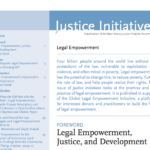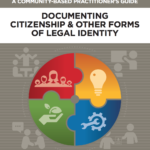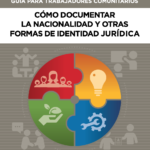Search Results for: open society

Justice Initiatives: Legal Empowerment
The latest edition of Justice Initiatives explores the nature of legal empowerment and its impact in various forms. With an introduction by George Soros, the book includes essays from Namati staff and Network Guidance Committee members, among others.
Policy Brief to ACERWC on Nationality Rights of the Nubian Child
In September 2011, the African Committee of Experts on the Rights and Welfare of the Child (ACERWC) published its first ever decision on a communication, in favor of the Nubian community in Kenya, recommending that Kenya undertake a series of actions to remedy the operation and lasting effects of systemic discriminatory treatment of this community…
CITIZENSHIP RIGHTS IN KENYA (Swahili)
The Kenya Citizenship program has developed Flip charts in Kiswahili and a smaller booklet version as paralegal guide. The vision of the flip charts is to guide the paralegals during community meetings. This was as a result of the inconsistency in the content of community meetings by the paralegals from the different parts of the…
CITIZENSHIP RIGHTS IN KENYA
The Kenya Citizenship program has developed Flip charts in Kiswahili and a smaller booklet version as paralegal guide. The vision of the flip charts is to guide the paralegals during community meetings. This was as a result of the inconsistency in the content of community meetings by the paralegals from the different parts of the…

A Community-Based Practitioner’s Guide: Documenting Citizenship and Other Forms of Legal Identity
Today, 1.1 billion people around the world lack legal identity documentation. Without it, they cannot vote, access healthcare, or go to school—and are at risk of becoming stateless. Entire communities—especially the poor and members of minority groups—may lack documentation, leaving them legally and politically invisible. The lack of effective citizenship prevents millions from realizing their…

Guía para Trabajadores Comunitarios Cómo Documentar la Nacionalidad y Otras Formas de Identidad Jurídica
Actualmente, 1.100 millones de personas en el mundo no cuentan con documentos que acrediten su identidad legal. Sin esto, no pueden votar, acceder a atención de la salud o ir a la escuela, y se exponen al riesgo de ser apátridas. Puede haber comunidades enteras—sobre todo de sectores de bajos recursos y miembros de minorías—sin…

Kenya Gallery
The Nubian People of Kenya Nubian people have lived in Kenya for several generations, brought to their current location from Sudan under the British Empire. However, even after Kenya became independent in 1964, Nubian communities continued to struggle for legal recognition and citizenship rights – despite the fact that Kenyan citizenship law is based…
The Challenges of African Legal Dualism: An Experiment in Sierra Leone
This short essay considers the challenges of legal dualism in Sierra Leone and explains the way Timap for Justice attempts to respond to those challenges.
